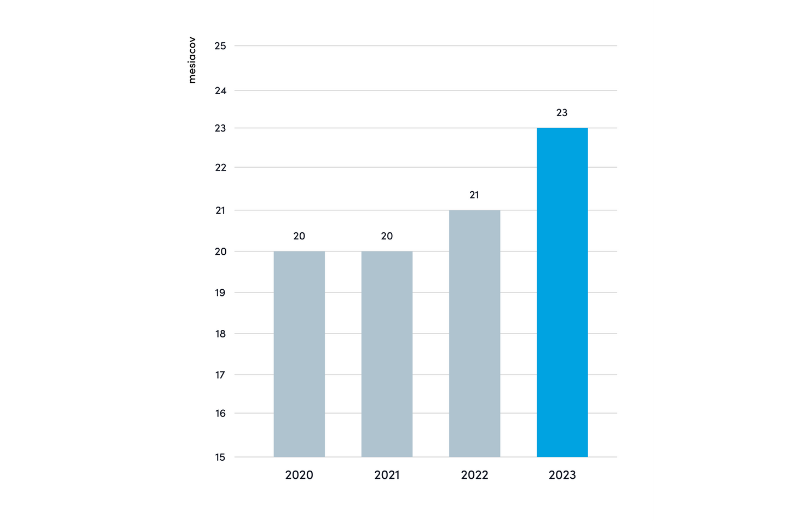The development of modern technologies and the changing market are raising new issues that were once unknown to the IT sector. At TITANS, we encounter complications that slow down organisations and demotivate IT talent daily. As a result, we believe that it is important to take a new perspective to find effective solutions.
According to a Deloitte survey of 211 CIOs and technology leaders in the US, one of the main priorities set by the IT department management is to stay ahead of new technologies and solutions. Moreover, geopolitical challenges and concerns about a potential economic slowdown have caused global IT investment to decline slightly in the past year, according to a survey by Deloitte in February. As a result, many technology companies launched mass layoffs of internal staff, which are still ongoing.
Lou DiLorenzo Jr, an AI and data strategy expert at Deloitte Consulting LLP, sees a way out of the adverse situation. He believes the IT sector needs more flexibility and a confluence of multiple components that companies will keep for shorter periods. TITANS is an international company that is a leader in IT talent outsourcing in the Slovak market, and we demonstrate the concept with four common business problems.
Unavailability of IT talent on the market
Today, it is increasingly challenging for companies to recruit talent with top-notch training in cybersecurity, machine learning and software architecture. The IT talent shortage is creating a vicious cycle for many organisations. Many are forced to take shortcuts in software development and deploy their technical specialists to maintain legacy systems instead of supporting growth, according to Deloitte. As a result, they are finding it increasingly difficult to meet long-term commitments to shareholders. The situation is particularly challenging for start-ups, which face fierce competition for top IT professionals.
It’s not surprising that 87% of executives consider full-time staff to be part of a larger ecosystem. This includes external organisations that provide professional services, long-term contractors, and freelancers that companies can hire as needed. The findings come from the 2021 Future of the Workforce global survey conducted by Deloitte and the MIT Sloan Management Review.
Since expertise is a luxury, outsourcing skilled individuals is a competitive advantage, according to Forbes. Although the average length of the first allocation required by our clients in 2023 was 7.58 months, Titans often stay on projects longer. Last year, the average length of the total allocation rose to 23 months.

Endless technical debt
According to the State of Tech Staffing Report‘s 2022 survey, on average, 20% of new people in a company need to be replaced later, making the investment in them a loss. Meanwhile, one of the key issues in business today is technical debt, which has grown over time in many organisations. The CIO magazine explains the technical debt as a suspension of innovation required by management, which in turn slows down the performance of companies.
Deloitte reports that as many as 70% of technology leaders consider it to be the leading cause of productivity losses for companies. But that’s not the only toll of technical debt. Companies must reckon with the operational costs associated with maintaining legacy hardware and software and with the difficulty of attracting and retaining top talent. In addition, technical debt makes a business susceptible to cyber threats because legacy systems may not have the same security features as modern technology. As a result, many brands are turning to outsourcing partners to supply them with experienced IT professionals to implement innovations.
Tight budgets
According to Deloitte, at the beginning of the pandemic, the technology industry thrived as companies stepped up their digital transformation efforts. However, in the last two years, the industry has faced several hurdles: high inflation, elevated interest rates, and significant macroeconomic and global uncertainty. All of this has contributed to a reduction in consumer spending, lower demand for products and a decline in market capitalisation.
However, several companies have realised that outsourcing provides an opportunity to reduce financial costs. For example, our clients budget their hours for IT support and only pay for the actual services delivered on an hourly basis. A partner specialising in IT talent outsourcing also saves company finances when it comes to the search for reinforcements. Building and maintaining a strong internal recruiting team is challenging and often costly. The strategic benefits of outsourcing IT talent are confirmed by the numbers: in 2023, TITANS allocated 139 freelancers. Currently, our company serves more than 650 domestic and international clients, including respected names such as Zurich Insurance, Sygic, Swiss Re, Erste Group, Accenture, Telekom, O2, Orange and Siemens.
Race against the threat of IT talent burnout
TechUK reports that the Burnout Index surveyed 32,644 IT professionals in 33 countries in 2022. The results revealed that two in five people surveyed report a high risk of burnout, with 42% considering leaving their role in the next six months. As a result, brands that have been a step behind for a long time and can never break out of the failure resolution cycle should stay alert. Forbes warns that constantly overloading internal IT staff could lead to burnout, so it pays off to act fast.
With an outsourcing partner for IT specialists, businesses get skilled support without unnecessary waiting and a long selection process. For example, our clients can expect to hire the selected person within 8 days of their request. In addition, from the large database of IT talent, we also provide clients with a pre-selection of suitable experts. This frees up internal teams and allows them to refocus on key innovative activities, which significantly increases efficiency and productivity.

Titans that have
joined us

Clients that have
joined us

Succcessfully supplied
man-days






